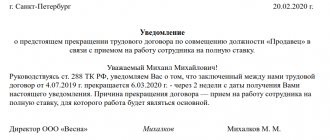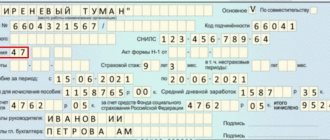Source: Magazine “Remuneration: Accounting and Taxation”
One of the grounds for dismissal at the initiative of the employer is dismissal due to repeated failure to fulfill job duties, if the employee has a disciplinary sanction (clause 5, part 1, article 81 of the Labor Code of the Russian Federation). However, when terminating an employment contract on this basis, the employer often makes mistakes, due to which the employee can be reinstated in his previous position. In this article we will consider in detail the procedure for dismissing a negligent employee, and also focus on its individual points.
Types of violations
Labor discipline is a set of norms of behavior, responsibilities, rules of corporate ethics, etc. Among the most common violations are:
- neglect of managerial ethics: subordination, order of actions in the process of managing the production cycle;
- non-compliance with technological and safety standards;
- deviations from the regime: established work schedule, continuity of production, duration of shifts, alternation of work and rest.
A complete list of offenses is given in Article 81 of the Labor Code of the Russian Federation. A gross violation of labor duties by an employee is:
- absenteeism (absence from work without a valid reason for more than 4 hours);
- unauthorized use of time off or vacation (without notifying the employer and drawing up an order);
- refusal to work the required 2 weeks after submitting a resignation letter of one’s own free will;
- non-compliance with the work regime on a business trip;
- appearing at work while intoxicated;
- disclosure of information constituting a secret (state, commercial, personal data, etc.);
- damage, destruction, theft of other people's property;
- non-compliance with labor protection measures: culpability in the occurrence of accidents and disasters, industrial accidents.
An employee who violates labor discipline in this way may be dismissed regardless of position, status and length of service. The exception is pregnant women.
What actions are considered violations?
When hiring a new employee, the employer is obliged to conclude a written employment contract, which stipulates the rights and obligations of the parties, the validity period if the work is supposed to be temporary.
The list of official (professional) responsibilities can be specified in the content of the official agreement or drawn up in a separate document.
A newly hired employee must be familiarized with local legal acts relating to labor relations, for example:
- internal regulations;
- collective agreement;
- labor protection instructions;
- others.
By and large, the employee is required to:
- fulfill your obligations in full;
- comply with the established routine and rules for safe work;
- treat the employer's property with care and if, due to the specific nature of the activity, he is entrusted with valuable or personal belongings of third parties.
In addition to a number of responsibilities that an employer has to hired workers, he, due to the subordination of his position, has rights, including:
- reward subordinates for effective work;
- hold accountable;
- initiate termination of employment under certain circumstances.
The issue of correct application of labor legislation is very sensitive. We will separately focus on what the legislator classifies as a gross violation of labor discipline.
Types of penalties
Responsibility for non-compliance with labor discipline is prescribed in Article 192 of the Labor Code of the Russian Federation. Depending on the offense committed, types of liability are provided:
- Oral remark. This is a punishment for an offense committed by an employee for the first time. In this case, the violation should not be significant, gross or dangerous for the activities of the enterprise or its specific employees.
- Rebuke. This penalty is recorded by drawing up an appropriate order from the manager. Imposed for repeated and (or) gross violation of labor regulations. It can be entered in the work book (usually this is done in the event of a repeated act that becomes the reason for dismissal).
- Termination of employment relations at the initiative of the employer. Dismissal is resorted to in case of gross non-compliance with labor discipline - single or repeated, refusal to perform job duties, as well as if the employee performs his duties poorly and inattentively, refuses to eliminate violations and revise his own approach to work.
Instead of a preface
First of all, it is necessary to determine what constitutes failure to fulfill labor duties. The main duties of the employee are established by Art. 21 Labor Code of the Russian Federation .
Labor functions are specified in more detail in employment contracts and job descriptions. Let us note that certain labor functions can be enshrined in other acts of the employer (for example, in orders). Naturally, the employee must be familiarized with his responsibilities by signature. In particular, Art. 68 of the Labor Code of the Russian Federation requires the employee to familiarize himself with the internal labor regulations, other local regulations directly related to the employee’s work activity, and the collective agreement. From this we can conclude that if the employment contract only stipulates the name of the position or profession (type of work), but does not specify the functions, and the employer forgot to familiarize him with the job description, then bring him to disciplinary liability for failure to fulfill job duties (and even more so dismiss him). under clause 5. part 1 of article 81 of the Labor Code of the Russian Federation ) will be very problematic. This conclusion is confirmed by judicial practice. Thus, the Perm Regional Court, in its Ruling dated May 14, 2014 in case No. 33-4192 , declared the orders to impose a penalty illegal and reinstated the employee in his previous position, and also recovered wages for the period of forced absence and compensation for moral damage due to the fact that in the absence of an official instructions and official familiarization with one’s official duties, it is impossible to establish the scope of the plaintiff’s duties and impute to him failure to fulfill duties.
Can being late for work be considered a failure to fulfill job duties? Yes, you can. The State Labor Inspectorate in St. Petersburg explained: since the employee is obliged to comply with internal labor regulations, being late can be considered a violation of labor discipline, for which the employer has the right to bring the employee to disciplinary liability, and in case of repeated lateness, even dismiss him.
In addition, according to paragraph 35 of Resolution No. 2 , failure by an employee to perform without good reason is failure to fulfill labor duties or improper performance through the fault of the employee of assigned labor duties (violation of legal requirements, obligations under an employment contract, internal labor regulations, job descriptions, regulations, employer orders, technical rules, etc.).
Such violations, in particular, include:
a) the employee’s absence from work or workplace without good reason;
b) refusal of an employee, without good reason, to perform labor duties in connection with a change in labor standards in accordance with the established procedure ( Article 162 of the Labor Code of the Russian Federation ), since by virtue of an employment contract, the employee is obliged to perform the labor function specified in this agreement, to comply with the internal labor rules in force in the organization regulations ( Article 56 of the Labor Code of the Russian Federation ).
We also note that dismissal under clause 5, part 1, art. 81 of the Labor Code of the Russian Federation is a measure of disciplinary liability, which means that the employer is obliged to comply with the procedure for bringing such liability established by Art. 192 , 193 Labor Code of the Russian Federation .
Thus, the Plenum of the Armed Forces of the Russian Federation in Resolution No. 2 indicated: when resolving disputes of persons dismissed under clause 5 of part 1 of Art. 81 of the Labor Code of the Russian Federation for repeated failure to fulfill labor duties without good reason, it should be taken into account that the employer has the right to terminate the employment contract on this basis, provided that a disciplinary sanction was previously applied to the employee and at the time of repeated failure to fulfill work duties without good reason, it has not been lifted and not repaid.
Let us note that if the disciplinary sanction is lifted or the employee violated labor discipline for the first time, then dismissal under clause 5 of part 1 of art. 81 of the Labor Code of the Russian Federation will most likely be declared illegal. For example, the Moscow Regional Court, having reinstated the employee at work, indicated that the dismissal procedure was violated, since the employee violated his job duties once, that is, there was no repetition ( Appeal ruling dated 06/04/2014 in case No. 33-12256/2014 ).
According to Part 2 of Clause 33 of Resolution No. 2, the application of a new disciplinary sanction to the employee, including dismissal under Clause 5 of Part 1 of Art. 81 of the Labor Code of the Russian Federation , is also permissible in the event that non-fulfillment or improper performance, through the fault of the employee, of the labor duties assigned to him continued, despite the imposition of a disciplinary sanction on him.
note
It should be borne in mind that the employer has the right to apply a disciplinary sanction to the employee even when, before committing the offense, he filed an application for termination of the employment contract on his own initiative, since the employment relationship in this case is terminated only after the expiration of the notice period for dismissal.
How to register a violation and punishment for it
The manager decides what measures to take against a negligent employee. To do this, he must have reliable information about the offense, supported by documents (memorandum, act). An approximate procedure for registering an offense and disciplinary action is as follows:
- Notifying the manager about the misconduct. Usually, for this purpose, an act is drawn up in two copies. If there were several episodes, the report must be drawn up for each separately.
- Demanding an explanation from the employee. Within three days, he can draw up an explanatory note indicating the reasons for the offense or refuse explanations. In this case, a corresponding act is drawn up.
- Issuance of an order to take measures (based on available documents). Formed no later than 30 days from the date of violation.
If the employee is absent from the workplace, a requirement to explain the misconduct and a copy of the dismissal order are sent to him by mail, with acknowledgment of receipt.
It is necessary to understand that when issuing a reprimand, and even more so when dismissing, it is very important to comply with the documentary regulations. If the procedure established by law is ignored or violated, the employee will have the opportunity to challenge the decision in court and even regain his labor rights.
The dismissal order must indicate:
- date of termination of the employment contract;
- the rationale for this decision;
- list of supporting documents.
On the last working day, an employee dismissed for a disciplinary offense is issued a labor and (if available) medical record book, a certificate of average salary for the last 3 months (2-NDFL), a form indicating the amount of salary for the last two years (for calculating sick leave), and any necessary certificates and extracts. Also, on the day of dismissal, it is necessary to make a full settlement with the employee. He must receive the amount due to him for days worked, compensation for unused vacation, severance pay, if it is provided for in an employment or collective agreement.
Still have questions?
Fill out the form and our expert will contact you!
What could be the consequences for the employer and employee?
It’s worth pointing out right away that for an employer, dismissing an employee due to failure to fulfill job duties will not entail any consequences. However, this is true if all the rules prescribed in the Labor Code of the Russian Federation are met.
If the employer commits a violation, he may face the following unpleasant consequences::
- an employee whose rights have been violated can file a lawsuit and be restored to his job;
- management will have to pay the illegally dismissed employee wages for the entire time during which he did not work due to the fault of the employer;
- payment of compensation for moral damage (if the dismissed person includes such a requirement in his statement of claim);
- administrative responsibility (Article 5.27 of the Code of Administrative Offenses of the Russian Federation).
For a former employee, dismissal due to failure to fulfill job duties will lead to difficulties in future employment. Not every employer wants to hire an irresponsible employee.
To summarize the above, it should be noted that when dismissing a person due to his failure to fulfill his official duties, including failure to fulfill the sales plan, it is very important to carefully check everything and formalize it correctly. Responsibilities must be clearly stated in the job description. If even one violation is committed, the employer may face unpleasant consequences.
What to do if you were fired illegally
If an employee believes that he was fired illegally, he can appeal this in court.
The period for applying to the court is one month from the date of receipt of the work record book or a copy of the order (Article 392 of the Labor Code of the Russian Federation). If upon termination of the contract the salary was not paid and it needs to be collected, the period is extended to one year from the date on which it should have been transferred. The statement of claim is filed in the district court at the address of the employer, who acts as the defendant. It is the plaintiff's responsibility to prove that the dismissal was unjustified. The defendant will prove that the termination of the contract was completely legal.
As evidence, the plaintiff has the right to use:
- any documents from work;
- audio and video recordings;
- certificates confirming that the functions were not performed due to being in court, a donor center, or another institution.
Witnesses may also be called to testify. A separate petition is filed for this, but it can be reflected immediately in the statement of claim.
If the court takes the plaintiff’s side, the employer will be obliged to reinstate him in his position, cancel the order and invalidate the entry in the work book.
In order not to waste time visiting the court, it is easier to submit a statement of claim along with other documents online through the State Automated System “Justice”. This is available to all people who have verified accounts on State Services.
Which employees should not be fired?
Not all workers can be dismissed at the initiative of the employer. This guarantee is provided to the following categories of employees:
- Pregnant women.
- Employees on vacation.
- Employees are on temporary disability.
- Women with a child under 3 years old.
- Single mothers with disabled minor children.
- Single mothers with children under 14 years of age.
- A parent who is recognized as the sole breadwinner of a disabled minor child.
The only situation in which these categories of workers can be fired is the liquidation of the company.
Disclosure of confidential information
An employer can fire an employee if he discloses state, commercial, official, or other legally protected secrets or personal data of a colleague. But only if the employee learned this information while performing his job duties.
To be fired for disclosing information, the following must be established:
- the employee learned important information directly in connection with his work activities;
- the employee provided information to one or more persons;
- information is considered a secret protected by law;
- The company has a system of access to information that is a secret protected by law.
In addition, it will be necessary to prove the fact of disclosure of such information, as well as that the employer protected confidential information as required by law.
Alexander Pensky, HR Director
If there is a leak of information constituting a state secret or official secret, the competent authorities will conduct an investigation for you. And when it comes to commercial information or know-how, you can investigate the incident yourself. In any case, based on the results of the investigation, a final document is drawn up, for example a resolution, decision or act. This document must be taken as the basis for drawing up an internal act on a disciplinary offense, request an explanation, familiarize the employee with it, and then issue a dismissal order.
Requesting an explanation from the employee
If an employee makes a mistake in his work activity, his manager must draw up a memo that describes the current situation in detail.
In turn, the employee writes an explanatory note indicating the reasons for the offense; this possibility is regulated by article of the Labor Code numbered 193 .
Find out how to write an explanatory note correctly from our article.
When demanding an explanation from an employee, managers should not forget about the statute of limitations - like this:
- If more than six months have passed since the violation, the employer cannot legally force the employee to write an explanatory note.
- If a violation is discovered not immediately, but after some time, no more than a month should pass from the date of its discovery, since in the future the manager’s demands to write an explanatory note to his subordinates will be illegal.
After management checks the explanatory note written by the employee, a decision will be made on the advisability and necessity of applying disciplinary measures to the subordinate.
If a positive decision is made, an appropriate order will be issued , supported by documents regulating the range of the employee’s duties and confirming the negative consequences that arose as a result of improper performance of his job duties.
Terms of dismissal
Making a decision to terminate a contract with a worker due to his failure to fulfill his duties is limited by Article 193 of the Labor Code of the Russian Federation. In particular, it states that this disciplinary sanction can be applied no later than a month from the moment of discovery of the violation that served as the basis (without taking into account the time of temporary disability, rest on vacation and obtaining the opinion of the trade union committee).
The second control point is the date of the order relative to the date the offense was committed. She must be no later than six months from him. Exclusion of faults identified by audits, revisions or inspections of financial and economic activities. In this case, the period is increased to two years. If the application of a penalty in the form of dismissal is limited to a decision in a criminal case, then the terms of its application relative to the date of commission of the offense are increased for the duration of the criminal proceedings.
Attention, the most common two critical errors:
- issuing an order earlier than 2 working days to provide explanations to workers;
- issuance of the order later than a month from the date of discovery of the offense. In this case, the error mainly arises from what is considered to be the reference point. This is not the moment when the information was brought to the attention of the head of the company, but the day when the fact became known to the line manager or another person of the company who is vested with control powers. That is, this may not necessarily be the person who has the right to apply disciplinary sanctions in the form of dismissal.
Drawing up a note-calculation
A settlement note is drawn up after the dismissal order is issued for the final settlement with the employee for wages and other payments. The document is filled out by an employee of the HR department, and payments are calculated directly by the accountant.
Form, sample and procedure for filling out a calculation note
Calculation note form
The calculation note consists of the front side, filled out by the HR department employee, and the back side, filled out by the accountant. The note is drawn up according to the unified form T-61 ().
How to fill out a note-calculation
On the front side
The following mandatory information must be provided:
- Employer's name.
- OKPO code.
- Document number and date of its preparation.
- Number and date of the employment contract.
- Full name, name of the structural unit and position of the employee.
- Date of termination of the employment contract.
- Grounds for dismissal.
- Date and number of the dismissal order.
- The number of unused vacation days, as well as days used in advance.
- Date of preparation of the document and signature of the HR department employee.
On the reverse side
The accountant makes calculations for vacation and other payments provided to the employee.
When writing a note, the following must be considered:
- In column 2
you must indicate the 12 months preceding the dismissal, and in column 1 the corresponding year(s). - Column 3
reflects the total amount paid to the employee in the corresponding month. - In column 4
the total number of calendar days in the reporting period is indicated. If the employee worked a full month, the average monthly number of days worked is used in the calculation - 29.3.
Note
: if the employee worked fewer days, the calculation is made using the formula: (29.3: number of calendar days in a month) x number of days worked.
- Column 5
must be filled out only when recording the employee’s working time in total. - Column 6
must reflect the employee’s average earnings (hourly or daily). Average earnings are calculated using the formula: Amount of payments for the year (Total line): Number of calendar days (column 4 or 5). - In column 7
you must indicate the number of vacation days used in advance. - Column 8
reflects the number of unused vacation days. - Column 9
calculates the amount of payment for unused vacation days.
In the table “Calculation of payments” the final calculation is made for the amount issued to the employee for calculation:
- Column 10
indicates the amount of accrued salary. - Column 11
reflects the amount of vacation pay calculated in column 9. - Column 12
indicates other accruals, if any. - Column 13
reflects the amount of all charges (the sum of columns 10, 11 and 12). - Column 14
indicates the amount of personal income tax calculated from the amount of payments on line 13. - Column 15
reflects the amount of other deductions from the employee’s salary, if any. - Column 16
indicates the total amount of deductions from the employee (the sum of columns 14 and 15). - Column 17
reflects the amount of debt the organization owes to the employee. - Column 18
indicates the employee’s debt to the organization, if any. - Column 19
indicates the total amount of funds to be paid to the employee, minus all deductions.
Sample of filling out a calculation note according to form T-61
Sample of filling out a note-calculation ().
Inconsistency of the employee with the position held
An employer has the right to terminate an employment contract with an employee who does not correspond to the position held or the work performed due to insufficient qualifications confirmed by certification results (clause 3, part 1, article 81 of the Labor Code of the Russian Federation). The compliance of the actually performed duties and qualifications of employees with the requirements of job characteristics is determined by the certification commission, therefore, the dismissal of an employee on the specified basis without certification is illegal (letters of Rostrud dated 04/30/2008 No. 1028-s, dated 03/06/2013 No. PG/1180-6-1) .
Dismissing an employee due to inadequacy for the position held is not very popular among employers, since it is considered too labor-intensive and time-consuming.
In addition, the employer may dismiss an employee who, based on the results of certification, does not correspond to the position held, only if it is impossible to transfer him to another job available to the employer (both a vacant position or work corresponding to the employee’s qualifications, and a vacant lower position or lower paid job), which he can perform taking into account his state of health (Part 3 of Article 81 of the Labor Code of the Russian Federation). The employee must be offered all vacancies available to the employer in a given locality that meet the specified conditions (vacancies in another locality are offered if this is provided for in the labor or collective agreement). The proposal to transfer the employee should be familiarized with signature.
note
The chief accountant cannot be fired due to loss of trust. This conclusion was reached by the Supreme Court of the Russian Federation in its ruling dated July 31, 2006 No. 78-B06-39.
If the employee does not want to transfer (a written refusal must be received) or there are no suitable vacancies (the employee must be notified of this, and the absence of vacancies must be confirmed by the staffing table), then the employment contract can be terminated. Please note that the period during which, based on the results of certification, the employer has the right to make a decision to dismiss an employee is not defined by the Labor Code. However, in paragraph 12 of the resolution of the State Committee for Science and Technology of the USSR and the State Committee for Labor of the USSR dated October 5, 1973 No. 470/267, which applies to the extent that does not contradict the Labor Code of the Russian Federation, it is said that a decision must be made to transfer an employee recognized as unsuitable for his position to another job from his the manager may consent within no more than two months from the date of certification. If the employee cannot be transferred to another job, the employer may terminate the employment contract with him within the same period.
It is worth noting that on this basis it is impossible to dismiss pregnant women, employees who have worked in the organization for less than a year (clause 4 of resolution No. 470/267), women with children under the age of three, single mothers raising a child under the age of 14 years (a disabled child under the age of 18), employees who do not have a diploma of special education, if it is not required by law, etc.
Is it possible to challenge a dismissal?
There are a lot of reasons why dismissal for failure to fulfill job duties can be challenged, as a rule, these are:
- shortcomings in the preparation of documents related to dismissal;
- failure to comply with deadlines for processes related to dismissal;
- absence of signatures on documentation, which serves as a basis for termination of the contract (orders, instructions, regulations);
- lack of a reasoned opinion of a higher trade union body (for non-exempt members of trade union bodies);
- deviation of the work performed from the function specified in the contract with the worker;
- inconsistency of the assigned complexity or volume of work with qualification reference books and professional standards, labor standards.
The reason must be disrespectful
If an employee has violated labor discipline more than once or committed one gross offense, these are grounds for dismissal. In both cases, the employee must not have a valid reason.
The law does not determine which reasons are considered valid and which are not valid. The employer decides this himself. Therefore, we recommend using common sense and judicial practice.
A reason can be considered valid if three conditions are met.
- If the situation was unexpected for the employee and he could not document his absence from work in advance.
- If the employee could not act independently for any reason.
- If the employee did everything possible to notify the employer, but it did not work.
When you understand that all three factors are present, it is better not to fire the employee. Most likely, the labor inspectorate will side with the employee, recognize the reason as valid and oblige the employer to pay a fine or reinstate the employee at work.
Andrey Likhachev, head of legal
If an employee who decided to quit does not return to work within two weeks from the date of filing the application, the reason is considered unjustified. Here's an example of a good reason. The employee asked in writing to give him the days of rest required by law, but the employer refused, and the employee did not go to work.
Contents and rules for drawing up a dismissal order
Since 2013, the employer has the right to use forms approved by internal legal regulations when issuing written orders.
Mandatory requirements for the content of the order remain:
- indication of the name of the organization acting as a legal entity;
- availability of registration number and publication date;
- the name of the administrative document with a brief thesis defining its essence;
- in the text part, the full last name, first name, patronymic of the dismissed employee, position held, and the exact date on which the employment relationship was terminated are specified, referring to the article number of the Labor Code (another industry law regulating labor relations);
- justify the decision with attached documents (this could be a report from the head of a structural unit, relevant acts, an internal memo);
- confirmation of agreement with the trade union;
- signature of the manager and the dismissed employee confirming familiarization with the document.
Order a free legal consultation
Establishing the fact of violation (non-fulfillment) of labor duties
Once the employer becomes aware of the employee’s failure to fulfill his job duties, it will be necessary to establish the fact of this violation. In particular, whether unfulfilled duties were included in the employment contract, job description and other local regulations. Also, the employer must prove why an extreme disciplinary measure will be applied for this violation, and not another, lighter one.
Note
: an employee can be dismissed on the specified basis only if at the time of the commission of the specified offense he has an outstanding disciplinary sanction. If the employee does not have a disciplinary sanction, then dismissal on this basis will be considered illegal.





